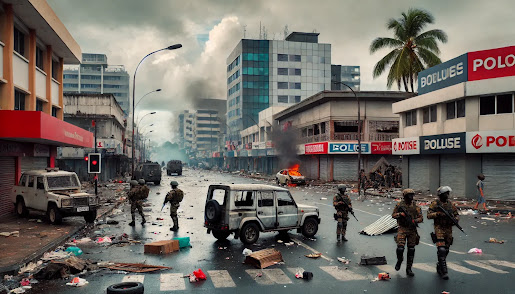France Declares State of Emergency in New Caledonia Following Violent Riots
In a significant escalation of tensions in New Caledonia, a French overseas territory in the South Pacific, the government of France has declared a state of emergency following days of violent unrest. The move comes as the region grapples with deep-rooted political, social, and ethnic tensions, compounded by economic hardships and disputes over its future political status.
The riots, which have caused widespread damage and disrupted daily life, began in the capital, Nouméa, and have since spread to other parts of the archipelago. The unrest was sparked by grievances ranging from economic inequality to disputes surrounding New Caledonia's potential independence from France. The situation has raised alarms both in Paris and internationally, with concerns over stability in the strategically significant region.
The Origins of the Unrest
The riots stem from longstanding tensions between the indigenous Kanak population and the descendants of European settlers, known as Caldoches, as well as other communities. The indigenous Kanak people, who make up around 40% of the population, have long advocated for independence, citing historical injustices and a desire for self-determination.
New Caledonia has held three referendums on independence since 2018, with the most recent in December 2021 resulting in a majority vote to remain part of France. However, pro-independence groups boycotted the vote, citing the impact of the COVID-19 pandemic on their campaign efforts. This has left the issue unresolved and heightened tensions between the pro-independence Kanaks and the pro-French factions.
The current unrest was reportedly triggered by a court decision perceived as unfavorable to Kanak land rights activists. This decision reignited anger over the perceived marginalization of the indigenous population and a lack of progress in addressing their concerns.
The Scale of the Riots
The riots have been marked by arson, looting, and violent clashes between protesters and security forces. In Nouméa, shops and government buildings have been set ablaze, while roads have been barricaded by demonstrators. The violence has disrupted transportation, commerce, and essential services, leaving the local population on edge.
France has deployed additional police and military personnel to the territory to restore order. Despite these efforts, the unrest shows no signs of abating, with reports of renewed clashes in several areas.
State of Emergency Declared
In response to the escalating violence, French President Emmanuel Macron convened an emergency meeting of his cabinet, during which it was decided to impose a state of emergency in New Caledonia. The declaration grants authorities additional powers to enforce curfews, restrict gatherings, and conduct searches without warrants.
"The situation in New Caledonia is grave and requires decisive action to protect lives, property, and public order," Macron said in a televised address. "France stands with all communities in New Caledonia and remains committed to finding a peaceful resolution to the underlying issues."
The state of emergency is expected to last for an initial period of one month, with the possibility of extension if the situation does not improve.
Local and International Reactions
The declaration has drawn mixed reactions within New Caledonia. Pro-independence groups have condemned the move as an overreach by the French government, accusing it of ignoring the root causes of the unrest.
"This is not just about the recent court decision or the riots," said a spokesperson for the Kanak and Socialist National Liberation Front (FLNKS), the main pro-independence coalition. "This is about decades of systemic inequality and the denial of our right to self-determination."
Pro-French leaders, on the other hand, have welcomed the state of emergency, emphasizing the need to restore law and order. "The violence is unacceptable and threatens the stability of our society," said Sonia Backès, a prominent pro-French politician. "We must work together to bring peace to our communities."
Internationally, the unrest has drawn concern from neighboring Pacific nations and global powers with strategic interests in the region. Australia and New Zealand have called for calm and urged dialogue between the opposing factions.
Economic and Strategic Implications
The riots and the subsequent state of emergency have significant economic and strategic implications for New Caledonia and France.
New Caledonia is rich in natural resources, particularly nickel, which is crucial for manufacturing batteries for electric vehicles. The ongoing unrest has disrupted mining operations and raised concerns about the security of supply chains.
Strategically, New Caledonia is a key part of France's Indo-Pacific presence, providing the country with a foothold in a region increasingly dominated by China. The instability in New Caledonia could undermine France's efforts to strengthen its influence in the Pacific and complicate its relationships with regional partners.
The Path Forward
As New Caledonia grapples with the immediate challenges of quelling the unrest, attention is turning to the long-term issues that need to be addressed to prevent a recurrence of violence.
Experts emphasize the importance of inclusive dialogue involving all stakeholders, including the French government, pro-independence groups, and pro-French factions. Such dialogue must address issues of economic inequality, land rights, and the future political status of the territory.
"The only way forward is through meaningful engagement and a commitment to justice and equality for all communities in New Caledonia," said Dr. Anne-Marie Legrand, a political analyst specializing in Pacific affairs.
In the meantime, the situation remains volatile, with residents of New Caledonia bracing for further uncertainty. The state of emergency may bring temporary relief, but the deeper divisions within society remain unresolved.
As France and New Caledonia navigate this challenging period, the world will be watching closely to see how this pivotal chapter in the territory's history unfolds. The outcome could have far-reaching implications not only for New Caledonia but also for the broader Pacific region and France's role within it.


